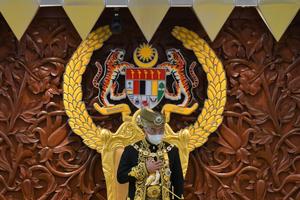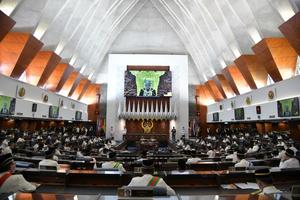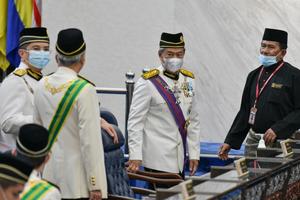 This handout photo from Malaysia's Department of Information, taken and released on May 18, 2020, shows Malaysia's King Sultan Abdullah Sultan Ahmad Shah wearing a face mask during the opening ceremony of the third term of the 14th parliamentary session in Kuala Lumpur. (NAZRI RAPAAI / MALAYSIA'S DEPARTMENT OF INFORMATION / AFP)
This handout photo from Malaysia's Department of Information, taken and released on May 18, 2020, shows Malaysia's King Sultan Abdullah Sultan Ahmad Shah wearing a face mask during the opening ceremony of the third term of the 14th parliamentary session in Kuala Lumpur. (NAZRI RAPAAI / MALAYSIA'S DEPARTMENT OF INFORMATION / AFP)
KUALA LUMPUR - Malaysia’s king on Monday said the appointment of Muhyiddin Yassin as prime minister during turmoil this year was proper and constitutional, days after parliament put off a vote on an opposition challenge to his leadership.
Surely, every contest will have a conclusion. The country’s political wrangling could not be allowed to fester without any end
King Sultan Abdullah Sultan Ahmad Shah,
King of Malaysia
Muhyiddin’s appointment on March 1, at the end of a week of political wrangling that led to the collapse of the ruling coalition, has been challenged by the opposition who say it was not clear that Muhyiddin had majority support from among the 222 members of parliament’s lower house, the Dewan Rakyat.
ALSO READ: Malaysian PM delays confidence vote, Mahathir cries foul
The lower house speaker had initially approved a motion tabled by Muhyiddin’s 94-year-old predecessor, Mahathir Mohamad, seeking a vote of no confidence in Muhyiddin, but the vote was postponed indefinitely after the government shortened Monday’s meeting, only allowing time for the royal address.
“Surely, every contest will have a conclusion. The country’s political wrangling could not be allowed to fester without any end,” King Sultan Abdullah Sultan Ahmad Shah said in his address broadcast live on national television.
“Hence ... in line with provisions under the Federal Constitution, I found that Tan Sri Muhyiddin Yassin had the majority support of members of the Dewan Rakyat and was qualified to be appointed as the eighth prime minister,” the king said, using Muhyiddin’s honorifics.
The king’s role is largely ceremonial and it is unlikely his endorsement of Muhyiddin’s appointment would have any sway over a vote in parliament on his leadership.
ALSO READ: A weakened Mahathir seeks to challenge Malaysia's new leader
Monday’s one-day meeting was the first time parliament convened this year. Its next session is scheduled for July 13 to Aug. 27. The king also warned lawmakers against resorting to hostility and slander.
“Honorable Members should always display maturity in politics,” the king said. “Do not revert the country to a situation of political turmoil while the people are still faced with various problems and a difficult future due to the COVID-19 pandemic.”
For the first time in the country’s history, the one-day session on Monday hosted only a speech by the king, leaving no time for representatives to discuss policies for addressing the pandemic or go through a planned confidence vote against the prime minister. Opposition lawmakers said the move showed Muhyiddin’s refusal to face them, while the premier said it was meant to reduce the risk of infections.
READ MORE: Malaysia palace denies 'royal coup' in appointing new PM
For the first time in the country’s history, the one-day session on Monday hosted only a speech by the king, leaving no time for representatives to discuss policies for addressing the pandemic or go through a planned confidence vote against the prime minister
The brief parliament sitting offered a glimpse of Malaysia’s new political landscape, which was roiled by a week-long power struggle that left both sides of the aisle fragmented.
The parliament’s seating arrangement, which should broadly be divided between the government and the opposition, saw the new leader of the opposition, Anwar Ibrahim sitting directly across from Muhyiddin. Former Prime Minister Mahathir Mohamad sat a few seats away, in between members of both sides of the divide.
“We call on the people to work together with the government to continue to develop the nation,” said the king. “We believe that only with solidarity between the people and the government will we be able to build a stable, peaceful and prosperous Malaysia.”
Muhyiddin is backed by parties from former ruling and opposition sides that on Sunday declared a deal to formalize a coalition. That includes the United Malays National Organisation (UMNO) party that supports race-based affirmative action policies, even as he sought to present himself as prime minister to all.
He’s also counting on support from the Bersatu party that he founded with Mahathir, who has secured the approval to launch a motion of no confidence against him.
READ MORE: Malaysian PM calls on Mahathir to endorse new govt
Despite being in the ruling coalition, UMNO leaders have openly criticized the government, especially on the distribution of aid and the implementation of a lockdown meant to contain the pandemic.
“Governance has to take a back seat to division of spoils,” said Wong Chin Huat, a professor at Jeffrey Cheah Institute on Southeast Asia in Sunway University. The current government “will stay on for a while unless the economy hits bottom and completely erodes their legitimacy.”
Surprise Growth
So far, the opposition coalition doesn’t pose a “credible threat” to the government, said Ahmad Martadha Mohamed, a professor of government at Universiti Utara Malaysia.
“With the country facing the crisis and the people’s mind preoccupied with health and economic issues, many attempts at destabilizing the government might not be well-received by the people,” he said.
 This handout photo from Malaysia's Department of Information, taken and released on May 18, 2020, shows Malaysia's King Sultan Abdullah Sultan Ahmad Shah (C) delivering a speech to members of the parliament during the opening ceremony of the third term of the 14th parliamentary session in Kuala Lumpur. (NAZRI RAPAAI / MALAYSIA'S DEPARTMENT OF INFORMATION / AFP)
This handout photo from Malaysia's Department of Information, taken and released on May 18, 2020, shows Malaysia's King Sultan Abdullah Sultan Ahmad Shah (C) delivering a speech to members of the parliament during the opening ceremony of the third term of the 14th parliamentary session in Kuala Lumpur. (NAZRI RAPAAI / MALAYSIA'S DEPARTMENT OF INFORMATION / AFP)
The government is working to implement its 260 billion ringgit (US$60 billion) stimulus package, the biggest in Southeast Asia as proportion of gross domestic product, while promising another set of measures to bolster an economy struggling with the effects of the pandemic. That has kept Malaysia from contracting, with the first quarter showing a surprise expansion of 0.7 percent, the slowest since 2009.
READ MORE: Malaysia drops 1MDB case against 'Wolf of Wall Street' producer
“Malaysia’s political scene has always been such that absent a general election, the incumbent government would always have the upper hand, as it possesses abundant political and other forms of largess to distribute around to acquire political support,” said Oh Ei Sun, senior fellow of Singapore Institute of International Affairs.
The stability of Muhyiddin’s government depends on UMNO, the biggest party backing him, Oh said. “So the current ruling coalition is likely to hold due to the major coalition parties’ common preference for racial and religious supremacy albeit in a multiracial and multicultural society, but whether it would continue to be led by Muhyiddin is at best questionable,” he said.
Political Turmoil
Muhyiddin came to power in March after the king named him as the one most likely to secure the support of a majority in parliament, ending a week of shifting allegiances among lawmakers who broke away from their parties and argued among themselves over whom to support as premier.
 This handout photo from Malaysia's Department of Information, taken and released on May 18, 2020, shows Malaysia's Prime Minister Muhyiddin Yassin (2nd R) wearing a face mask along with his cabinet members during the opening ceremony of the third term of the 14th parliamentary session in Kuala Lumpur. (NAZRI RAPAAI / MALAYSIA'S DEPARTMENT OF INFORMATION / AFP)
This handout photo from Malaysia's Department of Information, taken and released on May 18, 2020, shows Malaysia's Prime Minister Muhyiddin Yassin (2nd R) wearing a face mask along with his cabinet members during the opening ceremony of the third term of the 14th parliamentary session in Kuala Lumpur. (NAZRI RAPAAI / MALAYSIA'S DEPARTMENT OF INFORMATION / AFP)
The turmoil was set off by Mahathir’s abrupt resignation in February, leading his then-assumed successor Anwar Ibrahim to rise as his coalition’s candidate, before returning to the race too late.
Mahathir and Anwar have since joined hands, saying “it’s time” to restore an election mandate they won two years ago and issuing a statement together for the first time since their government was ousted.
READ MORE: DOJ: US reaches settlement to recover over US$49m involving 1MDB
“It would be foolish to underestimate Pakatan Harapan, especially Mahathir,” said Asrul Hadi Abdullah Sani, director at BowerGroupAsia. “However, the question remains as to whether Mahathir is willing to take a step back and let Anwar take the lead. One of the main reasons behind the collapse of the previous government was the distrust between the two leaders.”


